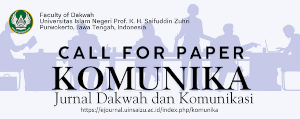GAGASAN PEMIKIRAN DAN GERAKAN DAKWAH M. NATSIR DI INDONESIA
DOI:
https://doi.org/10.24090/komunika.v4i2.155Keywords:
Natsir, Idea, and Da’wa Movement.Abstract
M. Natsir was one of the most prominent figures in religious discourse and movement in Indonesia. He was ada’wa reformer as well as a politician and a statesman.His most well known ideas were about the relationship between Islamand state, Islam and Pancasila, and his idea on da’wa. He stated that a country would be Islamic because of neither itsformal name as an Islamic state nor its Islamic state principles. The principles of the state could be generally formulated aslong as they referred to the Islamic values. Natsir also stated that the essence of Pancasila didn’t contradict with Islam; evensome parts of it went after the goals of Islam. However, it didn’t mean that Pancasila was identical with Islam. In relation toda’wa, he stated that it should be the responsibility of all Muslims, not only the responsibility of kiai or ulama. To make a da’wamovement successful, he suggested that it needed three integrated components; masjid, Islamic boarding school, andcampus.Downloads
Download data is not yet available.
Downloads
Issue
Section
Articles
License
Authors who publish with this journal agree to the following terms:
- Authors retain copyright and grant the journal right of first publication with the work simultaneously licensed under a Creative Commons Attribution-ShareAlike 4.0 International License that allows others to share the work with an acknowledgement of the work's authorship and initial publication in this journal.
- Authors are able to enter into separate, additional contractual arrangements for the non-exclusive distribution of the journal's published version of the work (e.g., post it to an institutional repository or publish it in a book), with an acknowledgement of its initial publication in this journal.
- Authors are permitted and encouraged to post their work online (e.g., in institutional repositories or on their website) prior to and during the submission process, as it can lead to productive exchanges, as well as earlier and greater citation of published work (See The Effect of Open Access).

























